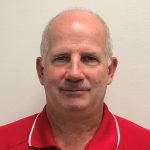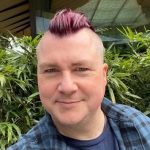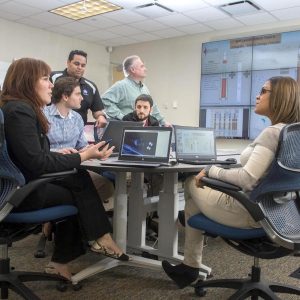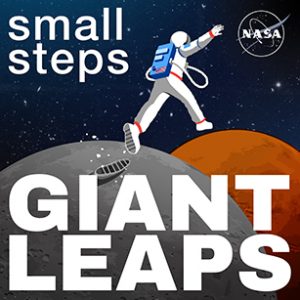NASA’s Nick Jedrich and Andrew Maynard discuss the benefits of developmental assignments.
NASA’s workforce is required to have the ability to design, develop, and execute one-of-a-kind projects in space exploration, aeronautics research, and scientific discovery. Formal development programs and hands-on learning help accelerate professional development and readiness to lead. Developmental work assignments provide opportunities for experiential learning in new tasks and functions, learning about the host organization’s operations, and exposure to agencywide decision-making processes.
In this episode of Small Steps, Giant Leaps, you’ll learn about:
- The benefits of developmental assignments
- Day-to-day teamwork and communication
- Potential impact of developmental assignments on career trajectory
Related Resources
NASA Office of the Chief Engineer
PM&SE Career Development Framework
Employee Development (NASA Internal)
OneNASA Career Channel (NASA Internal)
APPEL Courses:
Managing Virtual Teams (APPEL-MVT)
Change Management (APPEL – vTCM)
Creativity and Innovation (APPEL-vC&I)

Nicholas Jedrich
Credit: NASA
Nicholas Jedrich is the Office of the Chief Engineer (OCE) Science Mission Directorate (SMD) Chief Engineer (CE) serving as the independent technical authority for all SMD missions Jedrich is an experienced spaceflight developer, recognized as a systems engineering expert and proven manager with over 35 years of leadership for a vast variety of human, robotic, and technology demonstration missions. He previously served as Deputy Project Manager on the On-orbit Servicing, Assembly, and Manufacturing 1 mission. Prior to that role, Jedrich served as the Joint Polar Satellite System 2/3/4 Mission Manager, Suomi-National Polar-orbiting Partnership Flight Satellite Manager, Transiting Exoplanet Survey Satellite Deputy Project Manager, Mars Atmosphere and Volatile EvolutioN Instrument Systems Manager and Observatory Manager, and Express Logistics Carrier Deputy Project Manager. Jedrich began his career as a Guidance, Navigation and Control Engineer for the Space Shuttle Program and supported a variety of shuttle missions and instruments. He has a bachelor’s in engineering from Saint Louis University.

Andrew Maynard
Credit: NASA
Andrew Maynard is NASA Science Mission Directorate Deputy Chief Engineer serving on a detail assignment to the Office of the Chief Engineer at NASA Headquarters. Maynard previously served as Head of NASA Goddard Space Flight Center’s Propulsion Branch, where for five years he served as the Technical Authority for Propulsion at the center. His teams built the propulsion systems for the Europa Clipper and PACE missions and supported the development of multiple contractor-build propulsion systems for missions such as the James Webb Space Telescope and NOAA’s GOES and JPSS satellites. Maynard started his NASA career in 2000 as a mechanical engineer in Goddard’s Components and Hardware Systems Branch of the Guidance and Navigation and Control Division. Over his 16 years there, he designed avionics enclosures for space flight electronics, delivered guidance and navigation sensors such as gyros and GPS receivers to science missions, developed cold-gas nitrogen inflation and propulsion systems, and eventually became the Associate Branch Head. Maynard has a bachelor’s in mechanical engineering from the University of California, Davis and a master’s in aerospace engineering from the University of Maryland.
Transcript
Andrew Maynard: I think it’s important for folk that feel like they’re stalled in their career or that they’ve learned really what they can from a specific assignment to proactively look for development opportunities and chase the things that they have passion in, the things that they find fun.
Nick Jedrich: Especially as a mid-level career person at NASA, you really need to look for those opportunities that can take you to where you want to go on in your career, look for things that are maybe outside your comfort level, I mean, because that’s how you’re going to get real growth.
Host: Welcome to Small Steps, Giant Leaps, a NASA APPEL Knowledge Services podcast where we tap into project experiences to share best practices, lessons learned and novel ideas.
I’m Deana Nunley.
NASA employees interested in expanding their expertise and improving their technical and management skills have a variety of opportunities—including developmental work assignments.
We’re in conversation with two members of NASA’s technical workforce who recently participated in a developmental assignment.
Let’s start with introductions:
Nick: My name is Nick Jedrich. I have an incredibly long job title. I work for the Office of the Chief Engineer supporting the Science Mission Directorate as their Chief Engineer.
Andrew: And I’m Andrew Maynard and I am the Deputy Chief Engineer on detail to Office of Chief Engineer.
Host: Well, thank you both for joining us today on the podcast.
Andrew: Thank you for having us.
Host: To set the stage for our conversation. Nick, could you describe the developmental assignment that connected the two of you?
Nick: Right. So, the developmental assignment was for Deputy Chief Engineer. This is more than a one-person job so it’s normally a one-year detail. And we were looking for a person that could grow with the position, be exposed to what we do at Headquarters and the Office of Chief Engineer, and we selected Andrew from a few other good candidates.
Host: Andrew, what are some of the highlights for you?
Andrew: For me, the key highlights were stepping outside of the Goddard Space Flight Center where I spent the first 22 years of my career, and stepping into the Headquarters role really expanded my view of the entire agency, having the opportunity to work with chief engineers from six or seven different centers as well as Headquarters staff, and really understand how the wheels of the agency function. I think that’s been the biggest takeaway for me.
Nick: I think somewhat, Andrew, you also learned how the wheels turned slowly from time to time, would you say?
Andrew: Absolutely slowly, but I’d had the privilege of being exposed to that cadence earlier in my career. But it’s always interesting to see which parts move quickly and which parts move more slowly.
Host: When you think back to the start of this developmental opportunity, how would you compare what you expected to get from the assignment versus what you actually gained?
Andrew: Well, when I started, I wasn’t quite sure what I was going to jump into, but I expected to get some of that larger view of the agency. When you’re out at a center, it seems like sometimes you’re speaking different languages, and I really wanted to understand what we were missing at the center that Headquarters was trying to tell us. Because obviously there are a bunch of smart people there and I wanted to understand what the miscommunication in a few areas was. And what I gained was that plus so much more. I’ve developed good working relationships across the agency with a ton of folk, brilliant folk from all over the agency, and a real appreciation for the giant machine that NASA is and what it can really accomplish with brilliant folk at every level.
Nick: I think once the initial shock of Andrew finding out that, ‘Oh, I actually have to work with Nick?’ Once that was realized, I think it completely took off. I would say one of the unexpected things that happened during Andrew’s time as the deputy was that, prior to Andrew, we had a history of not very many propulsion system issues in our mission development in the portfolio of SMD missions. But promptly after Andrew took this position, we had more than a handful. So with his background in propulsion systems, it was a great opportunity for him to really show his knowledge and help these missions. And I’m hoping that now that he’s leaving, that we don’t have that many propulsion system problems, so that was a unique aspect.
But everything I expected from Andrew, I think he provided and more. He really shines in a leadership role. We allowed him to be exposed to all kinds of things. He actually ended up doing a two-year detail because of COVID and the fact that I didn’t think he got the exposure that the job really needed during the first year. So yeah, I couldn’t be more happy to have a deputy like Andrew.
Andrew: And similarly, I was excited to stick around. It’s probably been the highlight of my career.
Nick: I would say it seemed like two years went by awful quick, but it’s good.
Andrew: It did go awful quick.
Host: Andrew, you talked about what it was like to be at the center level and then making that shift to Headquarters. What are some of those perspectives that perhaps changed because of this assignment that you’ve done?
Andrew: Well, I think getting the exposure to the entire Science Mission Directorate portfolio really kind of set the perspective that at the Headquarters level, they’re looking at the strategic vision for the Science Mission Directorate and the agency as a whole, whereas at Goddard, we were just trying to get through one mission at a time, really focused down and in. And while Headquarters does pay keen attention to the progress and status of each individual mission in their 50-plus mission portfolio and development, they’re looking at the fleet as a whole. They’re dealing with budgets, schedules, congressional mandates, things like that. And that’s really a perspective that I hadn’t had the opportunity to see at the center level.
Host: Nick, how do you set job expectations in a developmental assignment?
Nick: Right, so there’s a few. I mean, this isn’t a new detail, we always had a deputy chief engineer as a detail and development assignment for as long as I can remember. I’ve been in this job for three years, so we had some history as to what we expected from a deputy chief engineer. We wanted a strong personality. We wanted a person that wasn’t afraid to speak out. We wanted a person with good communication skills and leadership. And we got all of that with Andrew and more, I think.
Our job really was to expose him to everything that not only the Office of the Chief Engineer does but everything that the Science Mission Directorate does and how those two entities interact and contribute to overall agency mission success because that is the number one job is to make our mission successful.
Host: You mentioned communication. How do you communicate?
Nick: So fortunately, Andrew just lives around the corner and so we communicate, we text, we do Teams calls, we do emails, we talk on the phone. During COVID, we used to have backyard lunchtime conversations on my back deck, and we also meet for lunch at a pizza place that’s about midway between both of our houses and convenient. So, it’s continuous because of all the issues that need timely responses from us. So yeah, I mean face to face is always great and that’s why even during COVID we would try to meet up where we could and taking appropriate precautions. But I would say it’s continually in different forms depending upon where we are.
Andrew: Yeah, we would probably use semaphore and smoke signals, too, if they were available to us. Yeah, we’re in constant communication. I think early on in the assignment, we would tag up maybe two, three times a day on a Teams call so we could see each other. And then as we really learned each other’s rhythms and patterns, our communication shifted subtly to just be like, ‘Hey, are you on that? Can you cover this meeting this afternoon? I got to go to this thing.’ And we tuned our communication to the needs of the time, whether it was time-sensitive or not. If it was time-sensitive, it was a text message. If it wasn’t, it was an email.
Nick: And sometimes a phone call as well. I mean, we would try two cans and a string but the distance’s a little bit further than that.
Andrew: A little bit far for two cans and a string.
Host: And what are your thoughts on how to work as a team?
Nick: Oh yeah, how to work as a team? I don’t know. We ad lib it most of the time. Very situational-dependent. We trust each other.
Andrew: Yeah, I think that trust element is huge. I think before this assignment, we hadn’t worked together before and we tried to get to know each other both professionally and personally. And I think hitting both of those aspects, you can develop a level of trust and then wrap that all in intense and often communication to build that teamwork.
Nick: And we’ve really become good friends so it’s pretty easy to work together that way. We have the same goal in mind professionally. Again, it’s all about making these missions successful and what we can do together to contribute to that success and ensure that it happens.
Andrew: I think one key element was from Day One, Nick made it clear that the scope of the assignment of the Chief Engineer’s Office for SMD is both of our jobs. We both succeed together, and we both fail together. And setting that expectation, there was never anything that was explicitly in my job jar or explicitly in Nick’s job jar. When an email came in, both of us were on it. We would coordinate who was responding and the other person, if they weren’t the prime on that response would chime in of, ‘Hey, make sure you mention this and this and this.’ And then we would review each other’s work, a constant back and forth to make sure that we were speaking with one coherent, comprehensive voice.
Nick: Right, a little bit of back and forth on and serious collaboration on the products that we generated, the recommendations that we would bring forward from a technical standpoint to the Science Mission Directorate divisions and the directorate in general, we would closely work together on those. We would assign, one of us would say, ‘Hey, you take the lead on this, or you take the lead on that. It’s more up your alley.’ Or again, with trying to expose Andrew to as much of the agency-level decisions and the process involved as possible.
Host: Andrew, has this opportunity changed your career trajectory?
Andrew: Absolutely. Without a doubt. When I first took the detail opportunity, I was a branch head at Goddard running a group of about 30 propulsion engineers. And I figured I’ll go downtown for a year, I’ll get some breadth of exposure, and I’ll come back to Goddard one level higher and go into division management, maybe as the deputy division head of the division that I was working in. And as soon as I got to Headquarters, within a week or two, I knew that that was no longer where I wanted to be. Seeing all the different moving parts of the agency and the opportunities and doors that had opened really, really changed my career trajectory. And actually, I’m moving forward into a new role at Headquarters as my next step.
Nick: And I think the other part of this is that we worked to expose Andrew to so many different things so that he could make that decision, he’d be prepared for whatever decision he wanted to make, that his communications, his leadership, his contributions were seen — that is that we could showcase his capabilities and hoping that it would lead to whatever opportunities were out there and wherever he decided to go with his next step in his career. So, it was providing that opportunity I think that that was always in the back of my mind was like, ‘Hey, I could do this, but I don’t need the exposure at the point of my career.’ And I would be like, ‘Hey, Andrew, you present this. We both put it together, why don’t you present that to agency management?’ And getting that recognition that he was capable of so much more than I think when he started two years ago.
Andrew: Yeah, Nick was absolutely an advocate for my career growth the entire time. One thing that I hadn’t realized that had been missing for several years was real mentorship. I think that’s something that agency struggles with of when you get into those more senior career roles, it’s often thought that you don’t need mentorship. But I’m a strong believer that everybody needs a mentor at any stage in their career. And Nick embraced that fully. He connected me with people. He opened doors for me. He made explicit efforts to find new opportunities for me to pursue and talked to me about what I wanted to do and why I wanted to do it and what aspects of those potential new assignments might be great for me, sharing his own experience in different roles throughout his career.
Host: Based on your experience, what advice would you offer to someone who’s trying to decide if they want to engage in a developmental assignment?
Nick: I would say jump in with both feet.
Andrew: Hear, hear, absolutely. I think learning and development is something that the agency absolutely prizes. I think when they say that our people are our most important asset, NASA absolutely stands behind that, and I’ve had some of the most outstanding training in my life here at the agency. But you also need to be a self-advocate. You need to go after opportunities that you see. You need to step away for a time to think about what your career goals are and what kind of development opportunities might be available because you might not even know about an aspect of the agency or an aspect of your career that you want to explore. And I highly recommend poking your head out of your project work and looking around seeing what’s available.
Nick: I agree. You need to, especially as a mid-level career person at NASA, you really need to look for those opportunities that can take you to where you want to go on in your career, look for things that are maybe outside your comfort level, I mean, because that’s how you’re going to get real growth, and take advantage of what you can. And a lot of it can be, if there’s not that many developmental assignments, I mean, look for people that can mentor you and coach you and help you move in the direction that you want to further your career aspirations.
Host: What do you think are the hesitations that people have about doing this — from either standpoint?
Andrew: I think that people are often consumed by their deadlines and their focus on a project. When you’re part of a mission team, you’re running full bore towards a clearly defined goal with a clear team of folk working with you, and it’s very easy to get lost week by week in the next assignment, the next assignment, the tactical thinking. And so, I think that that often dissuades people from pursuing development opportunities. They say, ‘Oh, I have to get this analysis done or I have to get this next milestone met.’
Nick: Right, it can be an interruption to what you’re used to, right? Again, you have to move outside of that comfort zone a little bit. When you’re on a project, as Andrew stated, you’re involved in your day-to-day tasks, what you need to do to get the mission from Point A to ultimately to the launch site and to launch in a timely schedule-driven manner. It doesn’t allow you at times a chance to raise your head up and get out of the weeds and look at say a longer-term perspective and look for those opportunities. So, I think, you get that tunnel vision, which I’m not saying is bad and the projects need people that to do that. But at some point, you might want to just take a look around.
Andrew: And I’ll add that when you’re working on a project or working with a team, there’s a sense of loyalty and commitment that’s formed within that team. And it can almost feel like an act of betrayal to step away and go do something new. I know when I took this opportunity, I stepped down from being the head of the Propulsion Branch at Goddard, and I felt like I was abandoning all of my people, and that was a tough thing for me to get past. But I’m really glad that I did. I think that my career was stagnating, and it was time to move forward. But that’s a real tough decision to make sometimes.
Host: How would you rate the value of developmental assignments and on-the-job learning opportunities?
Andrew: I think it was incredibly valuable. I had no idea how valuable it would be both professionally and personally to expose myself to new opportunities. I feel like I’ve been in a training program for two years and just absorbing new information like a sponge, which is something that really excites me. And I think it’s important for folk that feel like they’re stalled in their career or that they’ve learned really what they can from a specific assignment to proactively look for development opportunities and chase the things that they have passion in, the things that they find fun. And I think it’s important for work to be fun if it can be, and Nick definitely helped make it fun.
Nick: Yeah, everything’s not dead serious. I mean, this is rocket science to some extent but we always like to have fun doing this job as well, I think that’s a big component. As far as developmental assignments, I think they’re often overlooked. I wish we had more opportunities. It’s really a matter of how these things are funded, and I have tried to push, and I know in the Office of the Chief Engineer, we have worked to get more of these development assignments. I think it can really open a new world for people from the centers. And working on a developmental assignment, one of the values is the exposure to strategic thinking versus the tactical thinking that is mainly performed when you’re at a center, I think that’s an underrated benefit to people that are on developmental assignments. And that was one thing that I tried to expose Andrew to and I think with some success.
Andrew: Yeah, absolutely, absolutely.
Host: Many thanks to Nick and Andrew for joining us on the podcast. You’ll find their bios along with links to topics discussed on the show, related training courses, and a transcript of today’s episode at APPEL.NASA.gov/podcast.
If there’s a topic you’d like for us to feature in a future episode, please let us know on Twitter at NASA APPEL – that’s APP-el – and use the hashtag Small Steps, Giant Leaps.
As always, thanks for listening.







